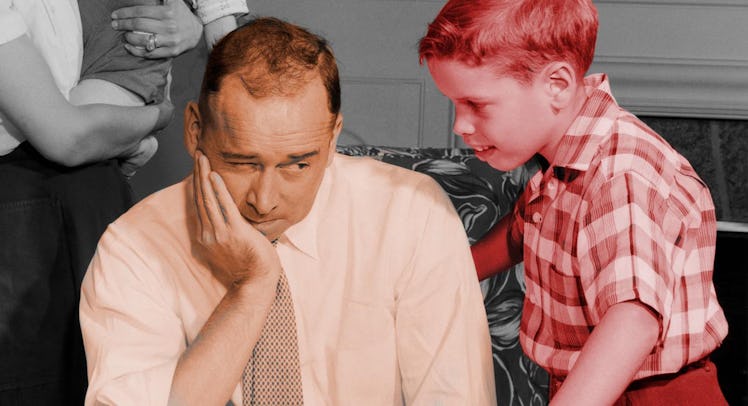How to Change Your Mind in Front of a Kid
When parents change their mind, it’s important to not make a really big deal out of it.

Children are fickle, but they are not alone. Adults are fickle too and the smart ones – the ones that pay attention and soak up information – tend to change their minds. This can present some awkwardness in the adult-child relationship, which is at its most reassuring when it’s at it’s most consistent. Feelings of both trust and safety can be undercut when parents go back on their word. “Daddy disagrees with himself,” is not a sentiment that inspires confidence in young kids. Because of this, managing a change of heart in front a child can feel like a faintly political process of backtracking and obfuscation. The trick to doing it well is not to make a big deal out of it and to hope – and this is arguably the part of the process most analogous to politics – that no one notices.
“Obviously we should try to not do it too frequently,” says clinical psychologist Anna Prudovski, clinical director of Turning Point Psychological Services. She notes that younger kids in particular have difficulty when a parent changes their mind because it erodes their sense of stability and parents should be the most stable people in a kid’s life. “It’s very important for parents to think before promising something,” she says. “It’s a very common mistake. It’s just easier for parents to promise just because they want children to feel better in the moment.”
But, of course, the moment is not the time to make guarantees for either better (“We’ll go tomorrow”) or worse (“I will throw all your toys away”). In the case of promises made in anger or out of expediency and subsequently broken, Prudovski urges a brief apology and a calm, simple, explanation as to why the change is occurring.
The apology, which might feel a bit unnatural, models humility to kids. Making the explanation brief keeps the change from becoming a big deal. “The best thing is to give a pretty quick response and see the kids reaction,” Prudovski explains. That’s because when parents defend, try to explain away the change or become too apologetic, they’re essentially signaling to their child they believe the kid can’t handle their error. “Sometimes we underestimate their resilience,” she says. “And they may be okay.”
If they are okay, there is nothing more to do. Parents can go on with their day happy to have dodged a tantrum. They can also rest secure in the knowledge that their kid confronted a disappointment and lived to tell about it. That’s ultimately a good thing, because a parent will not be the last adult in their life to disappoint them.
Some kids, however, may lose their shit. This isn’t the time for parents to offer more explanation. “Parents talk a lot when they are upset and stressed, but they don’t talk enough when they’re calm,” says Prudovski. “That’s not how to develop a relationship with a kid.” She suggests that parents should wait out the storm, not feeding the behavior, until the child is calm. At that point, a parent can ask their kid to help them find an appropriate solution to the problem.
In the case of a blown consequence, parents can ask the child if they can come up with a better consequence. In the case of poor time management a parent can collaborate with a kid on solutions, or do-overs, by offering a limited slate of options from which they can choose, like doing the activity on the weekend, or the same day after dinner, or maybe even at home.
“The further you are away from the situation in time and stress, then the deeper the discussion you can have about how sometimes we have to change our minds,” says Prudovski. Eventually that starts a dialogue that helps them deal with any sudden changes of mind, whether at home, at school, with adult or with friends.
This article was originally published on